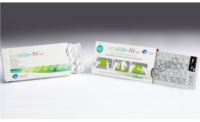Toppan Launches Sales of Eco-friendly NFC Tag Label

Toppan, a global leader in communication, security, packaging, décor materials, and electronics solutions, has developed an eco-friendly near-field communication (NFC) tag label that uses paper material as the substrate for the antenna instead of conventional polyethylene terephthalate (PET) film. Global sales of the new tag label were launched Jan. 23, with Europe expected to be a promising market due to the high level of environmental consciousness.
In addition to reducing plastic consumption to zero by switching to paper, a new circuit fabrication technology ensures sufficient communication performance as an NFC device. Taking advantage of the properties of paper as a substrate, the NFC tag label is designed to break when it is removed, making communication impossible and thereby preventing fraudulent use due to reattachment of labels.
The value of the global NFC tag market hit US$3.8 billion in 2020 and is expected to reach US$15.5 billion by 2030 [Source: Allied Market Research 2021]. In addition to increased use of contactless payment systems and supply chain management, this is driven by factors including more social distancing as a result of the COVID-19 pandemic.
NFC tag labels are predominantly produced by using metal foil to form an antenna on a plastic substrate, such as PET film. As governments and businesses advance activities to move away from the use of plastic, the market for NFC tags is seeing growing demand for replacing plastic with paper materials that have lower environmental impact. However, achieving sufficient communication performance has been challenging because the electrical resistance of circuits increases when printing methods employing conductive inks, such as widely-used silver nanoparticles, are used to form antennas on paper.
“Toppan’s new NFC tag label meets growing demand for more eco-friendly solutions as the NFC market expands globally,” said Takamitsu Nakabayashi, general manager of RFID/IoT and security development in Toppan’s DX Design Division. “We will expand sales globally, focusing particularly on the European market, where measures focused on reducing environmental impact are gathering pace.”
Looking for a reprint of this article?
From high-res PDFs to custom plaques, order your copy today!








